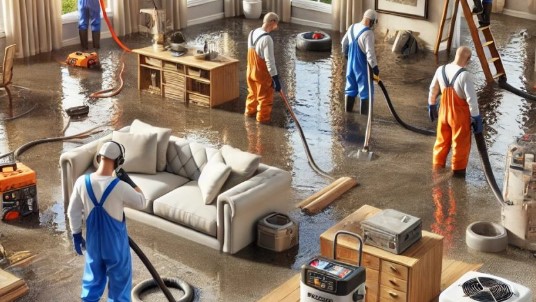Flood Repair
Floods can wreak havoc on homes and businesses, causing extensive water damage that can disrupt lives and lead to costly repairs. Prompt and effective flood repair is essential to minimize damage, protect your health, and restore normalcy. In this guide, we’ll explore the steps to take after a flood, professional services available, and preventive measures to safeguard your property against future flooding.
Understanding Flood Damage
Flood damage comes in various forms, including structural damage, electrical hazards, and mold growth. Common areas affected by flooding include:
- Walls and Floors: Prolonged water exposure can weaken structures, warp wood, and cause drywall to crumble.
- Electrical Systems: Water can damage wiring, outlets, and appliances, posing a fire hazard.
- Furniture and Personal Belongings: Sofas, carpets, and electronics are particularly vulnerable to water damage.
- Mold and Mildew Growth: Standing water and moisture create the perfect environment for mold, which can pose health risks.
Immediate Steps After a Flood
Acting quickly can significantly reduce the extent of flood damage. Here are the immediate steps to take:
- Ensure Safety:
- Turn off electricity at the main breaker to prevent electrical hazards.
- Avoid entering floodwaters, as they may be contaminated or conceal hazards.
- Document Damage:
- Take photos and videos of all affected areas for insurance purposes.
- Contact Your Insurance Provider:
- Notify your insurer and provide detailed documentation of the damage.
- Remove Standing Water:
- Use pumps, buckets, or wet/dry vacuums to eliminate standing water.
- Ventilate the Area:
- Open windows and doors to promote air circulation and speed up drying.
Professional Flood Repair Services
Hiring professionals ensures thorough flood repair and reduces long-term risks. Key services include:
- Water Extraction:
- Specialized equipment is used to remove water quickly and efficiently.
- Drying and Dehumidification:
- High-powered fans and dehumidifiers help remove moisture and prevent mold.
- Mold Remediation:
- Experts clean and disinfect affected areas to eliminate mold and mildew.
- Structural Repairs:
- Contractors repair or replace damaged walls, floors, and ceilings.
- Electrical Inspections:
- Licensed electricians inspect and repair water-damaged systems.
DIY Flood Repair Tips
For minor flooding, homeowners may tackle some repairs themselves. Here’s how:
- Clean and Disinfect:
- Use bleach and water to disinfect surfaces and prevent mold growth.
- Dry Belongings:
- Place soaked items in the sun or use fans to dry them thoroughly.
- Inspect for Damage:
- Check for cracks, warping, or weak spots in walls and floors.
- Replace Insulation:
- Remove and replace waterlogged insulation to prevent mold.
- Monitor for Mold:
- Keep an eye on damp areas for signs of mold and address them promptly.
Preventing Future Flood Damage
While floods can be unpredictable, taking proactive measures can reduce risks:
- Install a Sump Pump:
- A sump pump in your basement can help remove water during heavy rains.
- Seal Foundation Cracks:
- Use waterproof sealants to protect your foundation from water infiltration.
- Elevate Electrical Systems:
- Raise outlets, switches, and appliances above potential flood levels.
- Maintain Gutters and Drains:
- Ensure gutters and downspouts are clear of debris to direct water away from your property.
- Create a Flood Emergency Plan:
- Prepare an evacuation plan and have essential supplies ready in case of an emergency.
Importance of Acting Quickly
Delaying flood repair can lead to:
- Structural Deterioration:
- Prolonged water exposure weakens building materials, leading to expensive repairs.
- Health Risks:
- Mold and bacteria growth can cause respiratory issues and other health problems.
- Increased Costs:
- The longer you wait, the more extensive and costly the damage becomes.
Choosing the Right Flood Repair Professionals
When selecting a flood repair company, consider the following:
- Experience:
- Look for a company with a proven track record in flood repair.
- Certifications:
- Ensure technicians are certified in water damage restoration.
- Availability:
- Choose a provider that offers 24/7 emergency services.
- Customer Reviews:
- Check online reviews and ask for references to gauge reliability.
- Transparent Pricing:
- Request a detailed estimate before work begins.
Flood repair is a challenging but essential process to restore your property and protect your health. Whether you handle minor repairs yourself or hire professionals for extensive damage, acting quickly is crucial. By following the steps outlined in this guide and taking preventive measures, you can minimize the impact of future floods and safeguard your home or business.
If you’re dealing with flood damage, don’t hesitate to seek expert help. Professional flood repair services can ensure a thorough and efficient recovery, giving you peace of mind and a safe, restored property. Click here




